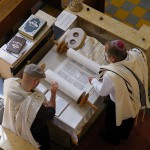Calling up the bridegrooms
 Normally we call someone to the Torah with the word, Ya’amod – “Arise!” – followed by the person’s Hebrew name. Simchat Torah is different.
Normally we call someone to the Torah with the word, Ya’amod – “Arise!” – followed by the person’s Hebrew name. Simchat Torah is different.
The Chatan Torah and Chatan B’reshit are called up with a highly elaborate formula beginning Mer’shut, “With the permission of the Almighty and the righteous band of the blessed congregation”, which asks God and man to approve the choice of the chatanim.
Whilst not a rhyme of the simpler kind known today, Mer’shut is made up of a series of sentences each ending in the syllable ra (nora, zimrah, etc.).
The version used for the Chatan B’reshit is by Menachem ben Machir (11th cent.); it was probably written later than the formula used for the Chatan Torah.
As we see from the famous 11th cent. liturgical work from the school of Rashi, the Machzor Vitry, a similar formula was used in medieval Franco-German communities when an ordinary bridegroom was being called to the Torah.
The idea is clearly that anyone singled out for honour must have the approval of the congregation and not be imposed upon them. This is not only an expression of the democratic principle that lies behind Jewish community life, but it also teaches a basic lesson in good manners – that decisions should be based on consultation.
We learn this from God Himself, who, according to midrashic tradition, asked the angels’ opinion before He created the world.
It must be said that not all the angels voted in favour of man being created. Man, some of the angels argued, would be unworthy to inhabit such a beautiful world; he would lie and cheat and destroy, and it would be better not to create him (B’reshit Rabba ch. 8).
God overruled the opposition – otherwise, we would not be here to tell the story – and it is up to us in every age to make sure that the angel critics are not proved right.



